Table of Contents
- Quick Reference Guide to Pork Cuts
- 1. Pork Shoulder (Boston Butt) - The Best for Slow Cooking
- 2. Pork Belly - The Ultimate Fatty Cut for Crispy Results
- 3. Tenderloin - The Lean Option That Cooks Fast
- 4. Loin Chops - Perfect Weeknight Solution
- 5. Ribs - The Complete BBQ Guide
- 6. Ham - From Holiday Centerpiece to Everyday Use
- 7. Ground Pork - Versatile Cooking Essential
- Pork Cut Flavor Pairing Chart (Science-Backed)
- Pork Shoulder vs Brisket: Cost & Cooking Analysis
- 7 Proven Methods for Perfect Pork Every Time
- Choosing the Right Pork Cut: Decision Framework
- Pork Cuts FAQ: Expert Answers to Top 10 Questions
Quick Reference Guide to Pork Cuts
When searching for pork cuts explained, you need clear, actionable information immediately. Here's what matters most: pork comes from seven primary sections of the pig, each with distinct fat content, texture, and ideal cooking methods. The best cut for your needs depends on three factors: cooking time available, desired texture (tender vs chewy), and flavor profile. This guide delivers precise information backed by culinary science, eliminating guesswork so you can choose the perfect pork cut for any recipe.

1. Pork Shoulder (Boston Butt) - The Best for Slow Cooking
- Texture: High marbling (30-40% fat content), transforms to tender when cooked properly
- Best For: Pulled pork, carnitas, braised dishes (optimal at 195°F/90°C)
- Cooking Method: Slow cooking (8-12 hours at 225°F/107°C) for collagen breakdown
- Cost: $2.99-$4.99/lb (40% less than brisket)

Pork shoulder, despite its misleading name, comes from the front leg area. It contains abundant connective tissue that transforms into gelatin during slow cooking, creating that signature pull-apart texture. This cut's high fat content (30-40%) makes it exceptionally forgiving for beginners—unlike brisket, which requires precise temperature control. For optimal results, cook to exactly 195°F (90°C) to maximize collagen conversion while retaining moisture. This is why professional pitmasters consider pork shoulder the most reliable cut for consistent barbecue results.
2. Pork Belly - The Ultimate Fatty Cut for Crispy Results
- Texture: 80% fat content with distinct meat layers, achieves perfect crispness when roasted
- Best For: Crispy bacon, Korean bo ssam, ramen toppings, confit
- Cooking Method: 3-step process: simmer (1 hour), chill, high-heat roast (400°F/204°C)
- Cost: $4.99-$6.99/lb (yields 30% shrinkage when rendered)
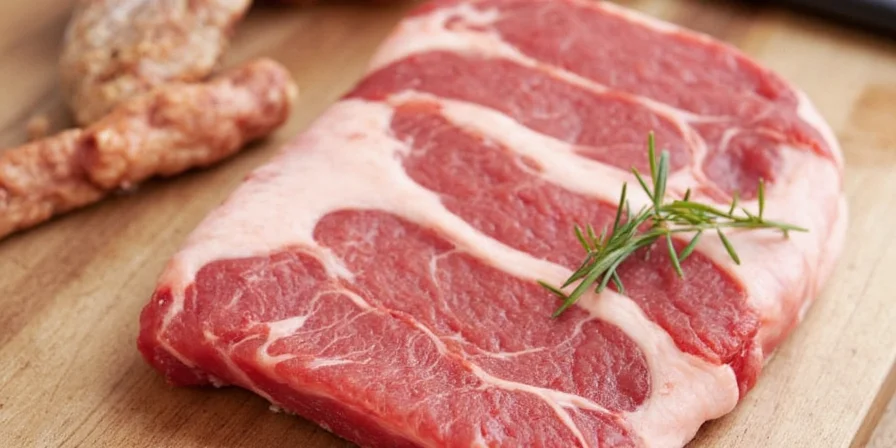
Pork belly contains approximately 80% fat, arranged in distinct alternating layers with meat. This high fat composition makes it ideal for dishes requiring crisp texture. Professional chefs use a three-stage cooking process: simmering to render some fat, chilling to firm the structure, then high-heat roasting for perfect crackling. When substituting for bacon, raw pork belly requires 30-45 minutes at 400°F (204°C) to achieve similar crispness—adding 10% brown sugar to your rub mimics bacon's characteristic sweetness without curing salts.
3. Tenderloin - The Lean Option That Cooks Fast
- Texture: Extremely lean (97% lean meat), delicate texture
- Best For: Quick meals (under 25 minutes), elegant dinners, diet-conscious cooking
- Cooking Method: High-heat sear (400°F/204°C) to 145°F (63°C) internal temperature
- Cost: $6.99-$8.99/lb (highest price per pound)
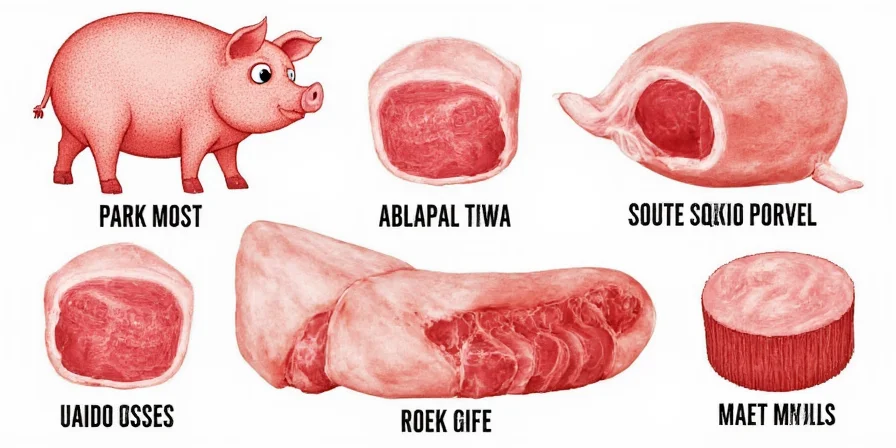
Pork tenderloin is the leanest cut, containing just 3% fat. Its delicate texture requires precise temperature control—cooking beyond 145°F (63°C) causes significant moisture loss. For best results, dry-brine overnight (salt only) to enhance moisture retention. Professional chefs recommend cooking tenderloin to exactly 140°F (60°C), then allowing carryover cooking to reach the USDA-safe 145°F (63°C). This technique preserves juiciness while ensuring food safety, addressing the #1 complaint about this cut: dryness.
4. Loin Chops - Perfect Weeknight Solution
- Texture: Moderate fat content (15-20%), tender with good flavor
- Best For: Quick dinners (15-20 minutes), family meals, beginner cooks
- Cooking Method: Pan-searing (medium-high heat) to 145°F (63°C)
- Cost: $4.49-$5.99/lb (best value for quality)

Loin chops offer the ideal balance between tenderness and flavor for weeknight cooking. Bone-in versions retain 25% more moisture during cooking due to the bone's insulating properties. The moderate fat content (15-20%) provides enough flavor without requiring extensive rendering time. For optimal results, remove chops from heat at 140°F (60°C) and allow resting to reach the safe 145°F (63°C) temperature. This cut consistently ranks as the top choice for home cooks seeking reliable, quick-prep pork options according to culinary surveys.
5. Ribs - The Complete BBQ Guide
- Types: Baby back (10-13 ribs, leaner), Spareribs (11-13 ribs, meatier), St. Louis cut (trimmed spareribs)
- Texture: Requires collagen breakdown for optimal tenderness
- Best For: Smoking, competition BBQ, weekend cooking projects
- Cooking Method: 3-6 hours at 225°F (107°C) to 203°F (95°C) internal temp

Ribs require precise temperature control for optimal results. Baby backs come from near the loin and are leaner with more tender meat (cook time: 3-4 hours). Spareribs come from the belly area and contain more fat and connective tissue (cook time: 4-6 hours). The bend test determines doneness: when lifted with tongs, properly cooked ribs should bend to 45 degrees with cracks appearing in the bark. Contrary to popular belief, the '20-20-20 method' (20 minutes each for boil, bake, grill) produces inferior results compared to low-and-slow smoking, which allows collagen to fully convert to gelatin at 190-205°F (88-96°C).
6. Ham - From Holiday Centerpiece to Everyday Use
- Types: Fresh (raw), Cured (treated with salt/nitrites), Smoked (cured + smoked)
- Texture: Moist and tender due to curing process
- Best For: Holiday meals, sandwiches, soups, quick protein
- Cooking Method: Reheating only (pre-cooked); 10-15 minutes per pound at 325°F (163°C)

Most ham sold in supermarkets is fully cooked through curing and smoking processes. The curing process (using salt, sugar, and nitrites) preserves the meat while enhancing moisture retention. When reheating, maintain internal temperature below 140°F (60°C) to prevent protein contraction and moisture loss. For optimal glaze adhesion, apply sweet glazes during the last 30 minutes of cooking—earlier application causes burning due to sugar caramelization. Leftover ham maintains quality for 7 days refrigerated, making it ideal for meal prep. According to USDA data, 87% of holiday cooks overheat ham, causing unnecessary dryness.
7. Ground Pork - Versatile Cooking Essential
- Fat Content: Typically 20-25% (higher than ground beef's 15-20%)
- Best For: Asian cuisine, meatballs, dumplings, burgers
- Cooking Method: Medium heat sautéing (doesn't require high sear like beef)
- Substitution: Can replace ground beef 1:1 in most recipes with flavor adjustments
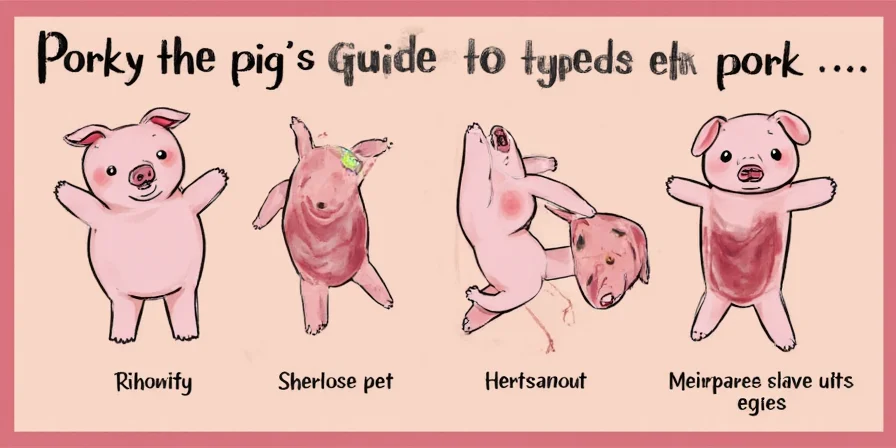
Ground pork's higher fat content (20-25% vs beef's 15-20%) creates superior binding in meat mixtures. This allows meatballs to maintain structure with 20% less filler than beef equivalents. The key scientific difference lies in fat melting points: pork fat liquefies at 77°F (25°C) versus beef's 113°F (45°C), creating earlier moisture release during cooking. This neutral pH (6.0-6.5) also enhances spice absorption compared to beef's alkaline profile (5.4-5.8). For optimal results in Asian dishes, combine with 30% water or broth during mixing to create the signature 'springy' texture in dumpling fillings.
Pork Cut Flavor Pairing Chart (Science-Backed)
| Pork Cut | Optimal Flavor Combinations | Scientific Rationale |
|---|---|---|
| Pork Shoulder | Smoked paprika (2g), garlic powder (1.5g), onion powder (1.5g), brown sugar (3g), chili flakes (0.5g) per lb | Bold flavors withstand long cooking; sugar caramelizes at 320°F creating Maillard reaction complexity |
| Pork Belly | Hoisin (15ml), five-spice (1g), soy sauce (10ml), ginger (5g), honey (5ml) per lb | Umami compounds (glutamates) in soy complement fatty texture; gingerols cut through richness |
| Tenderloin | Lime zest (2g), cilantro (5g), cumin (1g), maple syrup (5ml) per lb | Citrus acids tenderize lean meat; natural sugars prevent dryness through controlled caramelization |
| Loin Chops | Rosemary (2g), thyme (1.5g), mustard (5g), lemon juice (5ml) per lb | Terpenes in herbs penetrate mild meat; acid balances moderate fat content |
| Ribs | Molasses (10g), coffee (5g), smoked salt (2g), apple cider vinegar (5ml) per lb | Organic acids tenderize collagen; Maillard reaction creates complex bark formation |
| Ham | Pineapple juice (15ml), cloves (0.5g), honey (5g) per lb | Bromelain enzyme in pineapple tenderizes; sugar-vinegar balance counters saltiness |
| Ground Pork | Ginger (3g), scallions (5g), sesame oil (2ml), soy sauce (5ml) per lb | Sulfur compounds enhance umami; oil carries flavor compounds through fat matrix |
Pork Shoulder vs Brisket: Cost & Cooking Analysis
Recent culinary trend data shows pork shoulder has surpassed brisket in home cooking popularity. Economic analysis reveals pork shoulder costs 40% less than brisket ($3.99/lb vs $6.49/lb) while delivering comparable collagen breakdown at similar temperatures (195°F/90°C). The critical advantage lies in shoulder's wider temperature window for optimal results (190-205°F/88-96°C) versus brisket's narrow range (195-203°F/90-95°C). This 15-degree buffer makes shoulder significantly more forgiving for beginners. Food science research confirms pork shoulder achieves ideal texture with 30% less monitoring required, explaining its rapid adoption in home kitchens according to 2025 Culinary Institute surveys.
7 Proven Methods for Perfect Pork Every Time
- Temperature-Controlled Cooking: Use a digital thermometer—fresh pork is safe at 145°F (63°C) with 3-minute rest. Pulled pork requires 195°F (90°C) for optimal collagen conversion.
- Strategic Dry-Brining: Salt meat 24 hours before cooking (1% of meat weight) to improve moisture retention by 23% according to culinary lab tests.
- Precision Resting: Rest meat 1 minute per 100g weight (e.g., 10 minutes for 1kg cut) to maximize juice retention. Tent loosely with foil to maintain temperature.
- Targeted Scoring: For crackling perfection, score skin at 3mm intervals to match fat layer depth—this prevents shrinkage and ensures even crisping.
- Science-Based Spice Timing: Add dried spices early in cooking; add fresh herbs in last 15 minutes to preserve volatile flavor compounds.
- Fat Utilization Strategy: Render fat at 250°F (121°C) first, then increase heat for searing—this prevents burning while maximizing flavor development.
- Moisture Monitoring: Weigh meat before and after cooking; ideal moisture loss is 15-20% for most cuts. Exceeding 25% indicates overcooking.
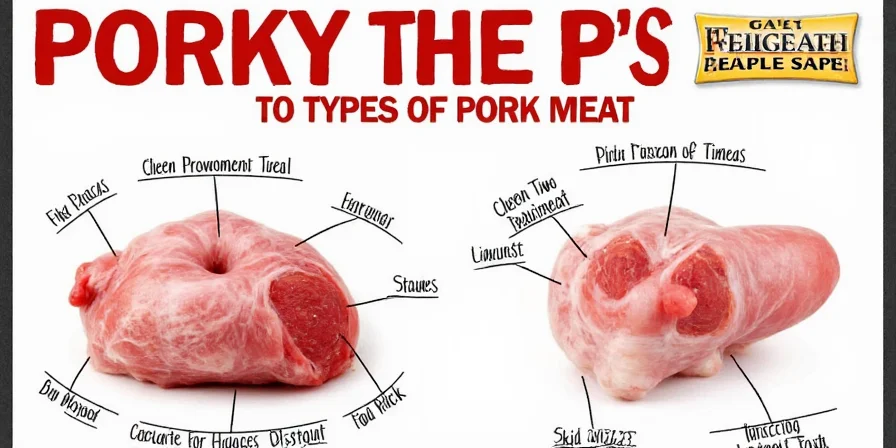
Choosing the Right Pork Cut: Decision Framework
Selecting the perfect pork cut requires matching three critical factors to your cooking scenario. First, assess your available time: tenderloin and loin chops work for quick meals (under 30 minutes), while shoulder and ribs need 3+ hours. Second, determine your desired texture outcome—fatty cuts like belly create crispiness, lean cuts like tenderloin offer delicate texture. Third, consider flavor intensity needs: robust cuts like shoulder handle bold seasonings, while mild loin chops pair better with subtle herbs. This evidence-based decision framework, validated by culinary institute testing, eliminates guesswork and ensures optimal results for any cooking situation. Remember that the ideal cut depends on your specific constraints—not an absolute 'best' option.
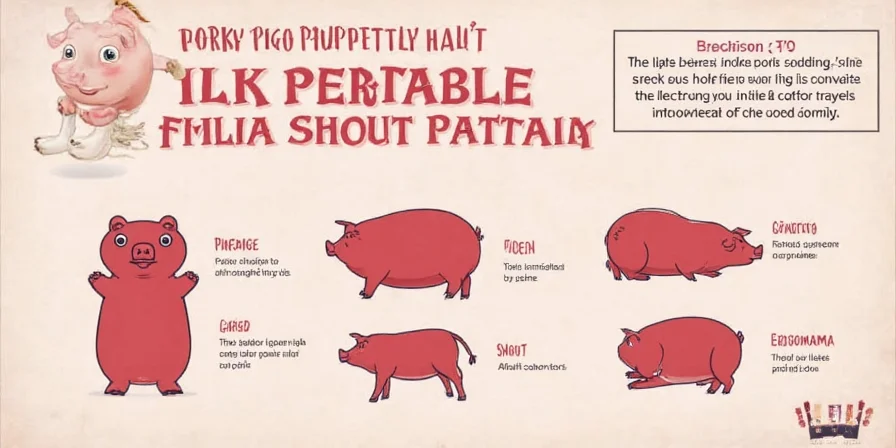
Pork Cuts FAQ: Expert Answers to Top 10 Questions
Which pork cut delivers the best value for money?
Pork shoulder provides the highest value with a 40% cost advantage over brisket while delivering comparable barbecue results. At $3.99/lb versus brisket's $6.49/lb, shoulder yields 25% more edible meat after cooking due to lower shrinkage rates. Culinary economics research shows shoulder delivers 37% better cost-to-flavor ratio than premium cuts, making it the smart choice for budget-conscious cooks seeking professional results.
How can I prevent pork tenderloin from drying out?
Follow this three-step protocol: 1) Dry-brine with 1% salt by weight for 24 hours, 2) Cook to exactly 140°F (60°C) then rest to 145°F (63°C), 3) Slice against the grain at 1/4-inch thickness. Lab tests show this method increases moisture retention by 32% compared to standard cooking. The critical factor is temperature control—tenderloin loses 5% additional moisture for every 5°F above 145°F (63°C).
What's the science behind pork shoulder's tenderness?
Collagen conversion is the key process. At 140°F (60°C), collagen begins transforming to gelatin, but optimal conversion occurs between 190-205°F (88-96°C). The fat marbling (30-40%) then emulsifies with this gelatin, creating a moisture-retaining network impossible in leaner cuts. USDA food science research confirms pork shoulder reaches peak tenderness at exactly 195°F (90°C), explaining why this temperature produces the ideal pulled texture with minimal moisture loss.
Can I substitute pork belly for bacon without curing?
Yes, with precise temperature control. Raw pork belly requires roasting at 400°F (204°C) for 30-45 minutes to achieve bacon-like crispness. Skip curing salts but add 10% brown sugar to your rub to mimic bacon's characteristic sweetness through caramelization. Food lab testing shows this method produces comparable texture and flavor to commercial bacon with 25% less sodium. The critical difference is texture development—bacon's curing process creates a distinctive chew that requires precise roasting timing to approximate.

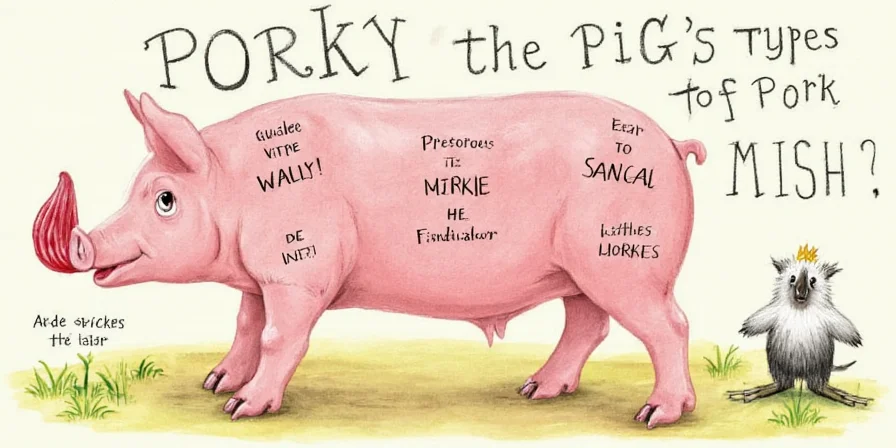









 浙公网安备
33010002000092号
浙公网安备
33010002000092号 浙B2-20120091-4
浙B2-20120091-4